Chapter2《A day in the life of…whiz-kid Wendy》教案7(牛津上海八年级上)
八年级英语A day in the life of…教案1
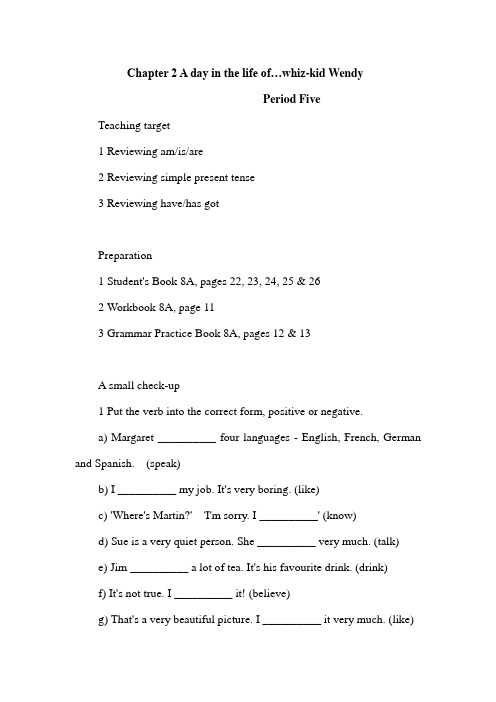
Chapter 2 A day in the life of…whiz-kid WendyPeriod FiveTeaching target1 Reviewing am/is/are2 Reviewing simple present tense3 Reviewing have/has gotPreparation1 Student's Book 8A, pages 22, 23, 24, 25 & 262 Workbook 8A, page 113 Grammar Practice Book 8A, pages 12 & 13A small check-up1 Put the verb into the correct form, positive or negative.a) Margaret __________ four languages - English, French, German and Spanish. (speak)b) I __________ my job. It's very boring. (like)c) 'Where's Martin?' 'I'm sorry. I __________' (know)d) Sue is a very quiet person. She __________ very much. (talk)e) Jim __________ a lot of tea. It's his favourite drink. (drink)f) It's not true. I __________ it! (believe)g) That's a very beautiful picture. I __________ it very much. (like)h) Mark is a vegetarian. He __________ meat. (eat)2 Complete the questions. Use these verbs:do do enjoy go like start teach worka) A: What __________?B: I work in a bookshop.b) A: __________ it?B: It's OK.c) A: What time __________ in the morning?B: At 9 o'clock.d) A: __________ on Saturdays?B: Sometimes.e) A: How __________ to work?B: Usually by bus.f) A: And your husband. What __________?B: He's a teacher.g) A: What __________?B: Science.h) A: __________ his job?B: Yes, he loves it.Language review1 Have students re-read the passages in A Talking about the presentand B Talking about how often things happen on pages 23 & 24.2 Ask students to re-read the passage they've learnt before. Then finish section E2 in E read and think on page 22 orally.3 Write 'How often' on the board.Ask: How often do you do some revision?Invite individuals to answer this question. They may give the followinganswers.I do some revision every day/once a week/twice a week/…4 Ask the following questionsa) How often do you wash your hair?b) How often do you go to see your grandparents?c) How often do your parents go to Nanjing Road Walkway?d) How often do you have a class meeting?e) How often does … go to Fuzhou Road?5 Review always/usually/often/sometimes/seldom/never with students again. Make sure they can use these words freely.6 Have students finish sections A1, A2, B1 & B2 on pages 23, 24 & 25 in no more than 10 minutes.Check the answers orally.Supplementary exercisesimpler present, am/is/are and have (got)1 Complete the sentences. Use the simple present tense.a) Sue always arrives at work early. (Sue/always/arrive)b) _______________ TV very often. (we/not/watch)c) How often _______________ your hair? (you/wash)d) I want to go to the cinema but _______________ to go. (Christ/not/want)e) _______________ to go out this evening? (you/want)f) _______________ near here? (Ann/live)g) _______________ a lot of people. (Sarah/know)h) I enjoy traveling but _______________ very much. (I/not/travel)i) What time _______________ in the morning? (we/usually/get up)j) My parents are usually at home in the evening. _______________ very often. (they/not/go out)k) _______________ work at five o'clock. (Tim/always/finish)l) A: What _______________? (Jill/do)B: _______________ in a hotel. (she/work)2 Read the questions and Claire's answers. Then write sentences about Claire.a) Q: Are you married?A: No.She isn't married.b) Q: Do you live in London?A: Yes._______________c) Q: Are you a student?A: Yes._______________d) Q: Have you got a car?A: No._______________e) Q: Do you go out a lot?A: Yes._______________f) Q: Have you got a lot of friends? A: Yes._______________g) Q: Do you like London?A: No._______________h) Q: Do you like dancing?A: Yes._______________i) Q: Are you interested in sport? A: No._______________3 Complete the questions.a) Susan: What's your name? David: Brian.S: _______________ married?D: Yes, I am.S: Where _______________?D: In Barton Road.S: _______________ any children? D: Yes, a daughter.S: How _______________?D: She's three.b) Jerry: _______________? Amanda: I'm 29.J: _______________?A: I work in a supermarket.J: _______________ your job?A: No, I hate it.J: _______________ a car?A: Yes, I have.J: _______________ to work by car? A: No, I usually go by bus.c) Emmy: Who is this man? Sammy: That's my brother.E: _______________?S: Michael.E: _______________?S: He's a travel agent.E: _______________ in London? S: No, in Manchester.4 Make sentences from these words.a) Sarah often/tennisSarah often plays tennis.b) I/a new car_______________c) my shoes/dirty_______________d) Sonia/32 years old_______________e) I/two sisters_______________f) we often/TV in the evening_______________g) Ann never/a hat_______________h) a bicycle/two wheels_______________i) these flowers/beautiful_______________j) Mary/German very well_______________Consolidation1 Workbook 8A, section E on page 11.2 Grammar Practice Book 8A, section B on pages 12 & 13。
Chapter 2 A day in the life of whiz 3
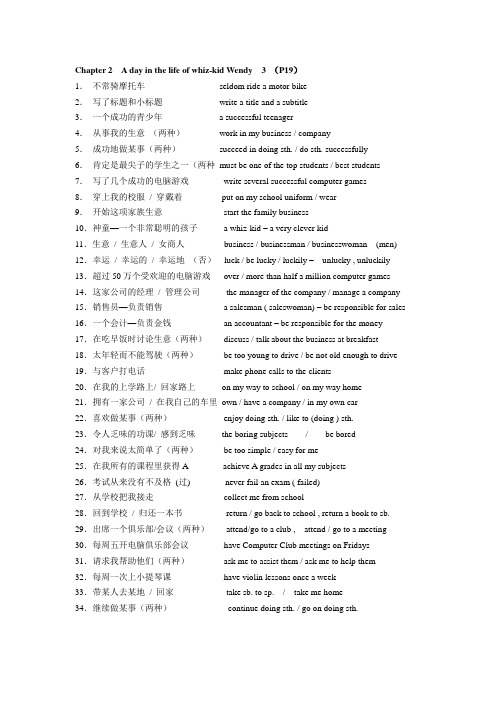
Chapter 2 A day in the life of whiz-kid Wendy 3 (P19)1.不常骑摩托车seldom ride a motor bike2.写了标题和小标题write a title and a subtitle3.一个成功的青少年 a successful teenager4.从事我的生意(两种)work in my business / company5.成功地做某事(两种)succeed in doing sth. / do sth. successfully6.肯定是最尖子的学生之一(两种must be one of the top students / best students 7.写了几个成功的电脑游戏write several successful computer games8.穿上我的校服/ 穿戴着put on my school uniform / wear9.开始这项家族生意start the family business10.神童—一个非常聪明的孩子 a whiz-kid – a very clever kid11.生意/ 生意人/ 女商人business / businessman / businesswoman (men) 12.幸运/ 幸运的/ 幸运地(否)luck / be lucky / luckily –unlucky , unluckily 13.超过50万个受欢迎的电脑游戏over / more than half a million computer games 14.这家公司的经理/ 管理公司the manager of the company / manage a company 15.销售员—负责销售 a salesman ( saleswoman) – be responsible for sales 16.一个会计—负责金钱an accountant – be responsible for the money 17.在吃早饭时讨论生意(两种)discuss / talk about the business at breakfast 18.太年轻而不能驾驶(两种)be too young to drive / be not old enough to drive 19.与客户打电话make phone calls to the clients20.在我的上学路上/ 回家路上on my way to school / on my way home21.拥有一家公司/ 在我自己的车里own / have a company / in my own car22.喜欢做某事(两种)enjoy doing sth. / like to (doing ) sth.23.令人乏味的功课/ 感到乏味the boring subjects / be bored24.对我来说太简单了(两种)be too simple / easy for me25.在我所有的课程里获得A achieve A grades in all my subjects26.考试从来没有不及格(过) never fail an exam ( failed)27.从学校把我接走collect me from school28.回到学校/ 归还一本书return / go back to school , return a book to sb. 29.出席一个俱乐部/会议(两种)attend/go to a club , attend / go to a meeting 30.每周五开电脑俱乐部会议have Computer Club meetings on Fridays31.请求我帮助他们(两种)ask me to assist them / ask me to help them 32.每周一次上小提琴课have violin lessons once a week33.带某人去某地/ 回家take sb. to sp. / take me home34.继续做某事(两种)continue doing sth. / go on doing sth.Chapter 2 A day in the life of whiz-kid Wendy 3 (P19)(中文) 1.不常骑摩托车2.写了标题和小标题3.一个成功的青少年4.从事我的生意(两种)5.成功地做某事(两种)6.肯定是最尖子的学生之一(两种)7.写了几个成功的电脑游戏8.穿上我的校服/ 穿戴着9.开始这项家族生意10.神童—一个非常聪明的孩子11.生意/ 生意人/ 女商人12.幸运/ 幸运的/ 幸运地(否)13.超过50万个受欢迎的电脑游戏14.这家公司的经理/ 管理公司15.销售员—负责销售16.一个会计—负责金钱17.在吃早饭时讨论生意(两种)18.太年轻而不能驾驶(两种)19.与客户打电话20.在我的上学路上/ 回家路上21.拥有一家公司/ 在我自己的车里22.喜欢做某事(两种)23.令人乏味的功课/ 感到乏味24.对我来说太简单了(两种)25.在我所有的课程里获得A26.考试从来没有不及格(过)27.从学校把我接走28.回到学校/ 归还一本书29.出席一个俱乐部/会议(两种)30.每周五开电脑俱乐部会议31.请求我帮助他们(两种)32.每周一次上小提琴课33.带某人去某地/ 回家34.继续做某事(两种)。
Chapter 2 A day in the life of whiz 4
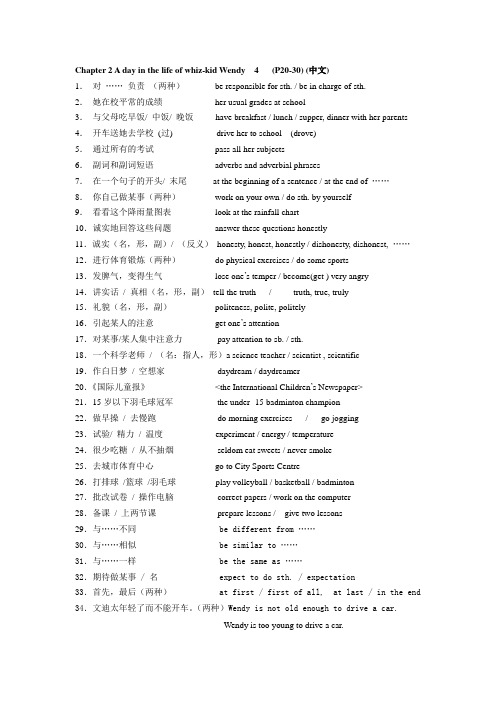
1.对……负责(两种)be responsible for sth. / be in charge of sth.2.她在校平常的成绩her usual grades at school3.与父母吃早饭/ 中饭/ 晚饭have breakfast / lunch / supper, dinner with her parents4.开车送她去学校(过) drive her to school (drove)5.通过所有的考试pass all her subjects6.副词和副词短语adverbs and adverbial phrases7.在一个句子的开头/ 末尾at the beginning of a sentence / at the end of ……8.你自己做某事(两种)work on your own / do sth. by yourself9.看看这个降雨量图表look at the rainfall chart10.诚实地回答这些问题answer these questions honestly11.诚实(名,形,副)/ (反义)honesty, honest, honestly / dishonesty, dishonest, ……12.进行体育锻炼(两种)do physical exercises / do some sports13.发脾气,变得生气lose one’s temper / become(get ) very angry14.讲实话/ 真相(名,形,副)tell the truth / truth, true, truly15.礼貌(名,形,副)politeness, polite, politely16.引起某人的注意get one’s attention17.对某事/某人集中注意力pay attention to sb. / sth.18.一个科学老师/ (名:指人,形)a science teacher / scientist , scientific19.作白日梦/ 空想家daydream / daydreamer20.《国际儿童报》<the International Children’s Newspaper>21.15岁以下羽毛球冠军the under -15 badminton champion22.做早操/ 去慢跑do morning exercises / go jogging23.试验/ 精力/ 温度experiment / energy / temperature24.很少吃糖/ 从不抽烟seldom eat sweets / never smoke25.去城市体育中心go to City Sports Centre26.打排球/篮球/羽毛球play volleyball / basketball / badminton27.批改试卷/ 操作电脑correct papers / work on the computer28.备课/ 上两节课prepare lessons / give two lessons29.与……不同 be different from ……30.与……相似 be similar to ……31.与……一样 be the same as ……32.期待做某事 / 名 expect to do sth. / expectation33.首先,最后(两种) at first / first of all, at last / in the end 34.文迪太年轻了而不能开车。
8a任务型阅读
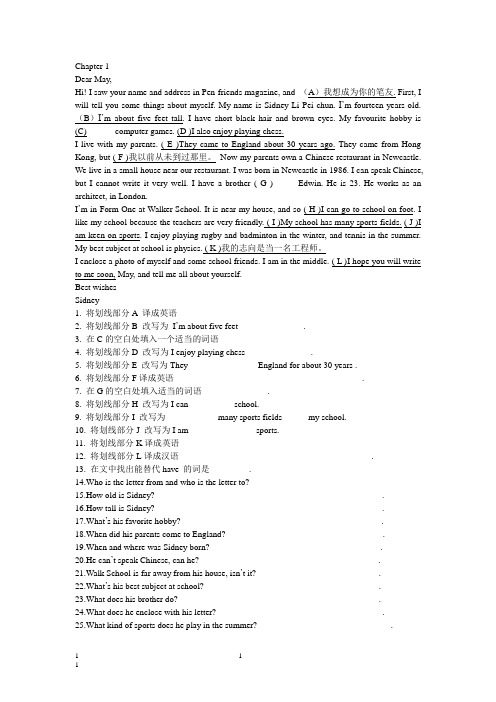
Dear May,Hi! I saw your name and address in Pen-friends magazine, and (A)我想成为你的笔友. First, I will tell you some things about myself. My name is Sidney Li Pei-chun. I’m fourteen years old. (B)I’m about five feet tall. I have short black hair and brown eyes. My favourite hobby is (C)______ computer games. (D )I also enjoy playing chess.I live with my parents. ( E )They came to England about 30 years ago. They came from Hong Kong, but ( F )我以前从未到过那里。
Now my parents own a Chinese restaurant in Newcastle. We live in a small house near our restaurant. I was born in Newcastle in 1986. I can speak Chinese, but I cannot write it very well. I have a brother ( G )_____ Edwin. He is 23. He works as an architect, in London.I’m in Form One at Walker School. It is near my house, and so ( H )I can go to school on foot. I like my school because the teachers are very friendly. ( I )My school has many sports fields. ( J )I am keen on sports. I enjoy playing rugby and badminton in the winter, and tennis in the summer. My best subject at school is physics. ( K )我的志向是当一名工程师。
英语:chapter 2《a day in the life of…whiz-kid wendy》period 3教案(1)(牛津上海版八年级下)
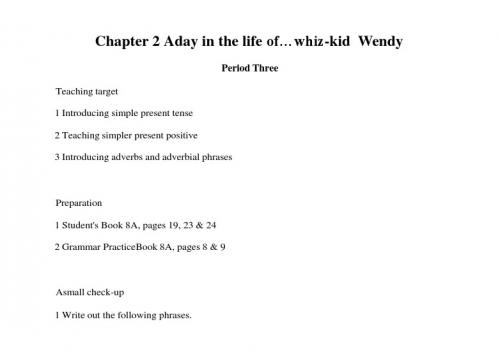
Preparation
1 Student's Book 8A, pages 19, 23 & 24 2 Grammar PracticeBook 8A, pages 8 & 9
Asmall check-up 1 Write out the following phrases.
a) go to bed b) have violin lessons c) return to school d) after school e) in ones own car f) at breakfast g) discuss thebusiness h) the manager of thecompany i) achieve Adegrees j) get up 2 Chooseand complete.
· He goes out every weekend. Shewatches alot of TV.
· Thefilm finishes at 9.30 tonight.
· He does everything for his children. · A mechanic fixes buses, cars and taxis. d) With verbs that end in consonant +y, thehe/she/it form is -ies: · Study - He studies languages at university. · Fly - The plane flies twicea week. BUT: I play - he plays I buy - shebuys e) Note: have - has · They have everything you want in that shop. · She has a housein St James' Square. 5 Question: When do weusethe simple present tense? 6 Using the simple present
上海牛津英语八年级Chapter2AdayinthelifeofWHIZ-KIDWENDY教学讲座PPT课件
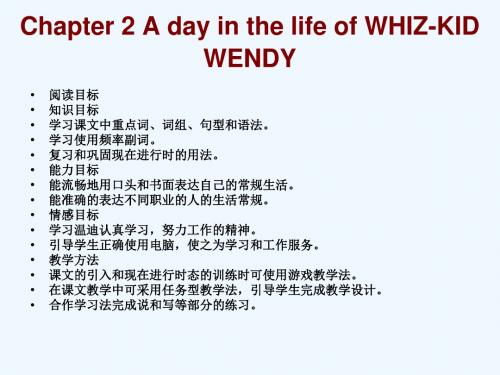
• popular a. liked by many people 流行的, 受欢迎的 • responsible a. having the duty to do something 有责任的 • responsibility n. • sale n. selling, the part of a business which tries to sell the product 销售,卖 • sell (sold,sold) v. salesman n. • continue v. go on 继续 • continuous a. continuously adv. • successful a. having succeeded 成功的 • succeed v. success n. successfully adv. • fail v. not pass an exam or test 失败, 不及格 • failure n.
• ②responsible是形容词,意为“有责任的,负责任的”。如: • Simon is a responsible boy.西蒙是个担得起责任的孩子。 • responsible的反义词为irresponsible,意为“不负责任的,不 可靠的”。 • be responsible for意为“对……负责(have the duty on)”,要 特别注意该词组中的介词搭配。如: • Who was responsible for the accident? 这宗意外应归咎于谁 呢? • ③sale是动词sell(卖,出售)的名词形式。如: • Not for Sale!非卖品! • That house is on sale.那座房子待售。 • sales常常用作表示“市场销售”,本文中的sales就为这个意 思。 • sale还有“大减价”的意思,如: • The shoe shop is having a sale this week.这家鞋店本周减 价销售。
八年级英语上册 Chapter 2 A day in the life of…whiz-kid Wendy测验题 上海牛津版
Chapter 2 A day in the life of…whiz-kid Wendy班级姓名学号________Part Ⅰ 听力部分Ⅰ、Listen and match the picture to the sentence you hear根据你听到的句子,选出内容相符的图片,用A、B、C、D、E或F表示,填入空格内:6%Ⅱ、Listen and choose the best response to the sentence you hear根据你听到的句子选出最恰当的应答,用A、B、C或D表示,填入括号内:6%( ) 1. a. No,it isn’t. b. Yes,it is.c. Yes,certainly.d. My pleasure.( ) 2. a. It’s near the cinema. b. It’s 10 minutes’ walk.c. No,it takes you only a few minutes to get there on foot.d. You can take a bus there.( ) 3. a. Thank you. b. Yes,please.c. Just a little.d. Don’t say that.( ) 4. a. Yes,I like. b. Yes,please.c. Yes,I’d love to.d. Yes,I like to.( ) 5. a. No,you mus tn’t. b. No,you needn’t.c. Sorry,I’m using it now.d. Sorry,I can’t lend any to you.( ) 6. a. Yes,of course. b. Yes,I will.c. All right.d. No,you can’t.Ⅲ、Listen to the dialogue and choose the best answer to the question you hear 根据你听到的对话和问题,选出最恰当的答案,用A、B、C或D表示,填入括号内:6%( ) 1. a. At home. b. At the railway station.c. In the library.d. In a shop.( ) 2. a. In Shanghai. b. On the way to Shanghai.c. On the way to Beijing.d. In Beijing.( ) 3. a. Canada. b. Australia.c. Britain.d. The United States.( ) 4. a. No,I don’t know. b. Yes,I have.c. Yes,you are right.d. No,I don’t have.( ) 5. a. At home. b. In the park.c. At school.d. He usually goes to see his friends.( ) 6. a. On foot. b. By car. c. By bike. D. By busⅣ、Listen to the passage and tell whether the following statements are true or false 判断下列句子是否符合你听到的短文内容,符合的用“T”表示,不符合的用“F”表示,填入括号内:6%( ) 1. Dr Buthume came from Canada in 1941.( ) 2. He died for the Chinese people in the war.( ) 3. He taught many people to be doctors.( ) 4. He died soon with that soldier.( ) 5. Few people came to China to help the Chinese people.( ) 6. He sav ed many people’s lives and set a good example of a doctorⅤ、Listen to the passage and complete the table听短文,完成下列表格,每空格限填一词:6%Part Ⅱ 词汇和语法Ⅰ、Write the words that go with the descriptions:6%1. talk about something2. selling,the part of a business which tries to sell the product3. be present;go to4. help someone do something5. very easy6. a person who plans,makes or repairs machines,engines,bridges,etc1. d_________2. s_________3. a_________4. a_________5. s_________6. e_________Ⅱ、Choose the right one用A或B表示:5%1. Wendy Wang is the top student and she usually ________ A grades.(A. achieves B. achives)2. It’s cold outside,you’d better ________(A. put on B. wear) a warm coat.3. This problem ________(A. is too simple to work out B. is simple enough to work out)4. I have five coins. Two coins are Chinese,________(A. the others coins B. the other coins) are American.5. I sometimes stop to buy some ice—cream ________(A. on my way to home B. on my way home).Ⅲ、Choose the best answer:13%( ) 1. It’s already 9:30 p.m.,but my father is still ____his new books.a. continuing workb. continuing workingc. continue workingd. continues to works( ) 2. You’re careless,You have missed ____ “h”in the word“machine”.a. ab. a nc. thed. ×( ) 3. The old usually ____.a. needs much sleepb. need much sleepc. need to much sleepd. need to have many sleeps( ) 4. The whiz—kid ____ 2 a.m.,He has a lot of work to do.a. go to bed untilb. goes to bed untilc. never go to bed untild. seldom goes to bed before( ) 5. ____ do you have violin lessons? Once a week.a. How longb. How farc. How many timesd. How often( ) 6. How do you come to school every day?I usually come to school ____.a. by carsb. in carc. on my own card. in a new car( ) 7. What do you usually do on weekends?I play rugby ____ Saturday morning and ____ Sunday.a. in….inb. in….onc. on….ond. on….in( ) 8. Which of the followings is simila r to “sales”.a. sell thingsb. selling thingsc. buy thingsd. buying things ( ) 9. Those folk songs ____.a. very popularb. like a lot of peoplec. are very populard. sounds wonderfully( )10. All pilots ___ the passengers’ safety.a. must be responsible forb. must be responsible toc. must responsible ford. are responsible to( )11. My sister likes making phone calls to her friends ____.a. on her way homeb. in the way to homec. on her way schoold. in the way home( )12. Some of the work ____.a. is simple enough for me to finishb. is too simple for me to finishc. are too simple for med. is too simple for we to finish( )13. –I am seldom late for school. --____.a. So am Ib. So seldom Ic. Neither am Id. Neither seldom IⅣ、Fill in the correct verbs用A、B、C……表示:4%1. She ___________________ her housework at home.2. Do you always go to school in your own car?No. I _____________________________ my own car.3. My sister always ________ English before dinner and ________ TV after dinner.1. ____2. ____3. ____、____Ⅴ、Change the sentences:10%1. Bill must be an actor.(改为否定句)Bill __________ __________ an actor.2. I am too young to drive.(保持原意)I am not __________ __________ to drive.3. My mother has the duty for sales.My mother is __________ __________ sales.4. We have Computer Club meetings on Friday.(否定句)We __________ __________Computer Club meetings on Friday.5. Oh,the banknote(纸币)is one thousand dollar.(保持原意)Oh,this is __________ __________ banknote.Ⅵ、Choose the word or expression which is closest in meaning to the underlined part:5%1. Hong Kong returned to China in 1997.2. Those cartoons are very popular.3. Wendy seldom goes to bed until 2:00 a.m.4. Some of the work is boring.5. The girl never fails an exam.1. ____2. ____3. ____4. ____5. ____Part Ⅲ 阅读和写话Ⅰ、阅读理解:5%An old woman is on her way home and she is carrying a large of groceries(食品,杂货). Suddenly a monkey comes and takes the groceries and runs away.Where does this happen? This happens in Hong Kong.Hong Kong is a big city with a big problem—a problem with monkeys. About 700 monkeys live in the forests near Hong Kong and they usually come to the city to eat their meals.The monkeys take bags of groceries from old women,take bread from babies,go into flats through open windows and take fruit from kitchen tables. In some flats the monkeys find cans of beer. They open the pop-top cans and drink the beer.The people of Hong Kong don’t want the monkeys in their city. They say,‘Hong Kong is not a good place for moneys. The forest is a good place for monkeys.’But the monkeys don’t want to eat in the forest because there is no bread in the forest,and there is no beer either.So,every day the monkeys come into the city. How can people stop them? Nobody knows!Decide whether the following statements are True(T) or False(F):( ) 1. Monkeys stay in Hong Kong because people in Hong Kong like them very much. ( ) 2. Monkeys in Hong Kong often take things from people’s hands.( ) 3. Monkeys in Hong Kong have got used to(习惯于)the life in the city of Hong Kong.( ) 4. People in Hong Kong have got some ways to get the monkeys back into the forests.( ) 5. The passage tells us about the monkey problem in Hong Kong.Ⅱ、Read the following and write the letters A、B or C in the brackets to match the question用A、B或C配问句:8%Life around here by Mi-Cha BongSchool officials want to change class times from 7:30 in the evening to 7:30 in the morning. What do you think?Hilmi Askin:‘I think it’s a terrible idea! I usually get up at 9:00 and even that’s difficult for m e. At night I like to watch TV and relax(休闲). I go to bed around 1:00 in the morning. Besides,I can’t catch a bus at that time of the morning.’Isabel Lopez:‘I think it’s a great idea. I’m always up at 5:00 in the morning. It’s the best time of the day. Fi rst I go jogging(慢跑). Then I take a shower,have breakfast and watch TV. A 7:30 class would be perfect(完美的)for me.’Hwa-Jeong Lim:‘I never get up before 9:00. I always have several cups of coffee. Then I walk the dog,check my e-mail,take a shower,call my parents,finish my homework and have breakfast. A morning class would be no good for me.’( ) 1. Who checks e-mail in the morning?( ) 2. Who likes the idea of early morning classes?( ) 3. Who needs a lot of coffee in the morning?( ) 4. Who likes to watch TV at night?( ) 5. Who gets up at 5:00 in the morning?( ) 6. Who phones family members every morning?( ) 7. Who goes to bed 1:00 in the morning?( ) 8. Who does homework in the morning?Ⅲ、Write the words缺词填空:5%NamesYou have a first name to tell who you are. You have a last name to tell which family you are f______. But a long,long time ago,people didn’t have last names. Later they had t______ invent(发明) last names b______ there were too many Charlies,too many Roberts,and too many Mary’s. People stared(瞪着眼睛) to ask,Which Charlie? Which Robert? Which Mary?So if a Charlie was a carpenter,he became Charlie Carpenter. If a Robert was a s______ of Peter,he became Robert Peterson. If a May l______ near the woods,she became Mary Woods.This is the way that some las t names started long,long ago.Ⅳ、Complete the dialogue:5%Shop assistant:1. ________Jim: I want to buy a shirt.Shop assistant:Oh,here are many shirts for young people. 2. ________Jim: No,I like white ones better.Shop assistant:White? 3. ________Jim: It looks nice. 4. ________Shop assistant:One hundred and eight yuan.Jim: Ok. May I try it on?Shop assistant:5. ________ (Pause稍停) you look nice in the shirt.Jim:I’ll take it.Ⅴ、Write at least five sentences about the topic “My spare time”(you can refer to the paragraph of 4:15p.m. of the text)以课文4:15p.m为参考,以My spare time 为题写五句话。
reading
This is my good friend, she usually get A grade at school.
She goes to badminton club at school, too.
club
/klʌb/
n. 俱乐部;社团
Zhen Hui’s daily life
B1 Look at these pictures, and think about your daily life. Which of these things do you • do every day? • do once or twice a week? • never do?
What about your daily life?
the title:
A day in the life of…
The subtitle: Whiz-kid Cheng Na
the picture
1. Cheng Na is probably ________most b other students.
3. Meimei cleans her bedroom every day. _______ ______ Meimei ______ every day?
I’m Cheng Na , my family and I work in my _________. Every morning we ________ business discuss business at breakfast. Sometimes I make phone calls to my______ on the way to school. clients get grade I usually ______A______ at school. About picks ______a week my driver______ me up from twice go to club school. Once a week I _______ a ______ after school. Once a week I have piano lesson. ______ After dinner I ________ working on my continue games.
Chapter 2 Period II
Secondperiod p18,19,20
Teaching Aims:
1. Language focus:
The main reading passage is about the daily life of a “whiz-kid” student who runs her own business while still at school. After learning the passage, make the students study hard and try their best to make our country stronger and richer.
Copy the new words
Students are required to do some exercises to consolidate what they’ve learnt.
To make the students put what they have learnt into practical use.
2. Ability aims:
To let the students inquire aboutinformation by asking questions.
To train the students’ ability of reading.
To help them to read for specific information.
Attract the students’ attention.
To help students be familiar with theformat of this report.
our daily life重难点解析
Unit 2 Our daily life(一)A day in the life of…whiz-kid Cheng Na神童程娜的一天title n. 标题subtitle n.副标题similar adj.相似的,类似的be similarto 与……相似be differentfrom 与……不同,不同于expect v.期待whiz-kid.神童business n.生意,公司(=company)manager n.经理client n. 客户,顾客,主顾achieve v.得到,实现grade n.分数fail v. 失败,不及格exam n.考试collect v. 接走return v.回,返回attend v.参加,出席continue v. 继续(二)comb n.梳子v.梳头nearby 和near byarrive v. 到达get 的用法walkhome 步行回家once aweek 一周一次spend……on 花费……在……上the onlychild 独生子女makebreakfast 做早饭(三)in the green dress穿着绿色礼服的, in the redshirt穿着红色衬衫的(在此注意in 的用法)holdcousin 表兄妹或表姐弟, nephew外甥或外甥女exceptfor 除……之外(四)completetimetablequarter , a quarter 一刻钟(=15分钟)biology 生物-----其它科目?go on foot = walk 走路去,步行前往on weekdays 和on the weekend二重点难点解析(一)1. Cheng Na, one of the top students inGuangzhou.程娜,广州的高材生之一。
*one of the top students = one of the beststudents高材生之一"one of+名词复数”表示“……之一”2. all of her family work in herbusiness.她所有的家人都在她的公司工作。
- 1、下载文档前请自行甄别文档内容的完整性,平台不提供额外的编辑、内容补充、找答案等附加服务。
- 2、"仅部分预览"的文档,不可在线预览部分如存在完整性等问题,可反馈申请退款(可完整预览的文档不适用该条件!)。
- 3、如文档侵犯您的权益,请联系客服反馈,我们会尽快为您处理(人工客服工作时间:9:00-18:30)。
Chapter 2 A day in the life of…whiz-kid WendyTeaching target1 Reviewing am/is/are2 Reviewing simple present tense3 Reviewing have/has gotPreparation1 Student's Book 8A, pages 22, 23, 24, 25 & 262 Workbook 8A, page 113 Grammar Practice Book 8A, pages 12 & 13A small check-up1 Put the verb into the correct form, positive or negative.a) Margaret __________ four languages - English, French, German and Spanish. (speak)b) I __________ my job. It's very boring. (like)c) 'Where's Martin?' 'I'm sorry. I __________' (know)d) Sue is a very quiet person. She __________ very much. (talk)e) Jim __________ a lot of tea. It's his favourite drink. (drink)f) It's not true. I __________ it! (believe)g) That's a very beautiful picture. I __________ it very much. (like)h) Mark is a vegetarian. He __________ meat. (eat)2 Complete the questions. Use these verbs:do do enjoy go like start teach worka) A: What __________?B: I work in a bookshop.b) A: __________ it?B: It's OK.c) A: What time __________ in the morning?B: At 9 o'clock.d) A: __________ on Saturdays?B: Sometimes.e) A: How __________ to work?B: Usually by bus.f) A: And your husband. What __________?B: He's a teacher.g) A: What __________?B: Science.h) A: __________ his job?B: Yes, he loves it.Language review1 Have students re-read the passages in A Talking about the present and B Talking about how often things happen on pages 23 & 24.2 Ask students to re-read the passage they've learnt before. Then finish section E2 in E read and think on page 22 orally.3 Write 'How often' on the board.Ask: How often do you do some revision?Invite individuals to answer this question. They may give the followinganswers.I do some revision every day/once a week/twice a week/…4 Ask the following questionsa) How often do you wash your hair?b) How often do you go to see your grandparents?c) How often do your parents go to Nanjing Road Walkway?d) How often do you have a class meeting?e) How often does … go to Fuzhou Road?5 Review always/usually/often/sometimes/seldom/never with students again. Make sure they can use these words freely.6 Have students finish sections A1, A2, B1 & B2 on pages 23, 24 & 25 in no more than 10 minutes.Check the answers orally.Supplementary exercisesimpler present, am/is/are and have (got)1 Complete the sentences. Use the simple present tense.a) Sue always arrives at work early. (Sue/always/arrive)b) _______________ TV very often. (we/not/watch)c) How often _______________ your hair? (you/wash)d) I want to go to the cinema but _______________ to go. (Christ/not/want)e) _______________ to go out this evening? (you/want)f) _______________ near here? (Ann/live)g) _______________ a lot of people. (Sarah/know)h) I enjoy traveling but _______________ very much. (I/not/travel)i) What time _______________ in the morning? (we/usually/get up)j) My parents are usually at home in the evening. _______________ very often. (they/not/go out)k) _______________ work at five o'clock. (Tim/always/finish)l) A: What _______________? (Jill/do)B: _______________ in a hotel. (she/work)2 Read the questions and Claire's answers. Then write sentences about Claire.a) Q: Are you married?A: No.She isn't married.b) Q: Do you live in London?A: Yes._______________c) Q: Are you a student?A: Yes._______________d) Q: Have you got a car?A: No._______________e) Q: Do you go out a lot?A: Yes._______________f) Q: Have you got a lot of friends? A: Yes._______________g) Q: Do you like London?A: No._______________h) Q: Do you like dancing?A: Yes._______________i) Q: Are you interested in sport? A: No._______________3 Complete the questions.a) Susan: What's your name? David: Brian.S: _______________ married?D: Yes, I am.S: Where _______________?D: In Barton Road.S: _______________ any children? D: Yes, a daughter.S: How _______________?D: She's three.b) Jerry: _______________? Amanda: I'm 29.J: _______________?A: I work in a supermarket.J: _______________ your job?A: No, I hate it.J: _______________ a car?A: Yes, I have.J: _______________ to work by car? A: No, I usually go by bus.c) Emmy: Who is this man? Sammy: That's my brother.E: _______________?S: Michael.E: _______________?S: He's a travel agent.E: _______________ in London?S: No, in Manchester.4 Make sentences from these words.a) Sarah often/tennisSarah often plays tennis.b) I/a new car_______________c) my shoes/dirty_______________d) Sonia/32 years old_______________e) I/two sisters_______________f) we often/TV in the evening_______________g) Ann never/a hat_______________h) a bicycle/two wheels_______________i) these flowers/beautiful_______________j) Mary/German very well_______________Consolidation1 Workbook 8A, section E on page 11.2 Grammar Practice Book 8A, section B on pages 12 & 13学я优╝中═考+,网。
